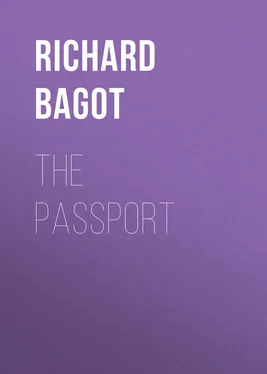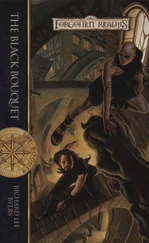Richard Bagot - The Passport
Здесь есть возможность читать онлайн «Richard Bagot - The Passport» — ознакомительный отрывок электронной книги совершенно бесплатно, а после прочтения отрывка купить полную версию. В некоторых случаях можно слушать аудио, скачать через торрент в формате fb2 и присутствует краткое содержание. Жанр: foreign_antique, foreign_prose, на английском языке. Описание произведения, (предисловие) а так же отзывы посетителей доступны на портале библиотеки ЛибКат.
- Название:The Passport
- Автор:
- Жанр:
- Год:неизвестен
- ISBN:нет данных
- Рейтинг книги:4 / 5. Голосов: 1
-
Избранное:Добавить в избранное
- Отзывы:
-
Ваша оценка:
- 80
- 1
- 2
- 3
- 4
- 5
The Passport: краткое содержание, описание и аннотация
Предлагаем к чтению аннотацию, описание, краткое содержание или предисловие (зависит от того, что написал сам автор книги «The Passport»). Если вы не нашли необходимую информацию о книге — напишите в комментариях, мы постараемся отыскать её.
The Passport — читать онлайн ознакомительный отрывок
Ниже представлен текст книги, разбитый по страницам. Система сохранения места последней прочитанной страницы, позволяет с удобством читать онлайн бесплатно книгу «The Passport», без необходимости каждый раз заново искать на чём Вы остановились. Поставьте закладку, и сможете в любой момент перейти на страницу, на которой закончили чтение.
Интервал:
Закладка:
The news Sor Beppe had brought had awakened other memories – memories which took him back to the days before he was a priest; when he had been a young fellow of three or four and twenty, very free from care, very good to look upon, and very much in love.
It was strange, perhaps, that the impending arrival at Montefiano of an elderly lady and a girl of seventeen, neither of whom Don Agostino had ever seen, should arouse in him memories of his own youth; but so it was. Such links in the chain that binds us to the past – a chain that perhaps death itself is powerless to break – are perpetually forging themselves in the present, and often trifles as light as air rivet them.
In this case the link had been forged long ago. Don Agostino remembered the forging of it every time he donned the sacred vestments to say mass, and was conscious that the years had riveted it only more firmly.
It was, perhaps, as well that his housekeeper was busy plucking a chicken in the back premises; and it was certainly as well that none of his flock could have observed their pastor's actions when he had shut himself into his study, otherwise unprofitable surmises, long rejected as such, would have cropped up again round the measures of wine in the Caffè Garibaldi that evening.
For some time Don Agostino sat in front of his writing-table thinking, his face buried in his hands. The joyous chattering of the house-martins flying to and from their nests came through the open windows, and the scent of roses and Madonna lilies. But presently the liquid notes of the swallows changed into the soft lapping of waters rising and falling on marble steps; the scent of the lilies was there, but mingling with it was the salt smell of the lagoons, the warm, silky air blowing in from the Adriatic. The distant sounds from the village street became, in Don Agostino's ears, the cries of the gondoliers and the fishermen, and Venice rose before his eyes – Venice, with the rosy light of a summer evening falling on her palaces and her churches, turning her laughing waters into liquid flame; Venice, with her murmur of music in the air as the gondolas and the fishing-boats glided away from the city across the lagoons to the Lido and the sea; Venice, holding out to him youth and love, and the first sweet dawning of the passion that only youth and love can know.
Suddenly Don Agostino raised his head and looked about him as one looks who wakes from a dream. His eyes fell upon the crucifix standing on his table and on the ivory Christ nailed to it. And then his dream passed.
Rising, he crossed the room, and, unlocking a cabinet, took from it a tiny miniature and one letter – the only one left to him, for he had burned the rest. The keeping of this letter had been a compromise. For do not the best of us make a compromise with our consciences occasionally?
The face in the miniature was that of a young girl – a child almost – but exceedingly beautiful, with the red-gold hair and creamy coloring of the Venetian woman of the Renaissance.
Don Agostino looked at it long; afterwards, almost mechanically, he raised the picture towards his lips. Then, with a sudden gesture, as though realizing what he was about to do, he thrust it back into the drawer of the cabinet. But he kissed the letter before he replaced it beside the miniature.
It was merely another compromise, this time not so much with his conscience, perhaps, as with his priesthood.
"Bianca!" he said, aloud, and his voice dwelt on the name with a lingering tenderness. "Bianca! And she – that other woman – she brings your child here – here, where I am! Well, perhaps it is you who send her – who knows? Perhaps it was you who sent me to Montefiano – you, or the blessed Mother of us all – again, who knows? It was strange, was it not, that of all places they should send me here, where your child was born, the child that should have been – "
The door was flung open hastily, and Don Agostino's housekeeper filled the threshold.
" Madonna mia Santissima! " she exclaimed. "It is your reverence, after all. I thought I heard voices – "
"Yes, Ernana, it is I," said Don Agostino, quietly.
" Accidente! but you frightened me!" grumbled the woman. "I was plucking the chicken for your reverence's supper, and – "
"So I perceive," remarked Don Agostino, watching feathers falling off her person to the floor. "And you heard voices," he added. "Well, I was talking to myself. You can return to the chicken, Ernana, in peace!"
"The chicken is a fat chicken," observed Ernana, reflectively. " A proposito ," she added, "will your reverence eat it boiled? It sits more lightly on the stomach at night – boiled."
"I will eat it boiled," said Don Agostino.
"And with a contorno of rice?"
Don Agostino sighed.
"Rice?" he repeated, absently. "Of course, Ernana; with rice, certainly with rice."
III
Palazzo Acorari, the residence in Rome of the princes of Montefiano, was situated, as has already been said, in that old quarter of the city known as the Campitelli. It stood, indeed, but a few yards away from the piazza of the name, in a deserted little square through which few people passed save those whose business took them into the squalid streets and vicoli opening out of the Piazza Montanara.
It was not one of the well-known palaces of Rome, although it was of far greater antiquity than many described at length in the guide-books; neither was it large in comparison with some of its near neighbors. Nine people out of ten, if asked by a stranger to direct them to Palazzo Acorari, would have been unable to reply, although, from a mingled sense of the courtesy due to a forestiero , and fear of being taken for forestiero themselves, they would probably have attempted to do so all the same, to the subsequent indignation of the stranger.
There was no particular reason why Palazzo Acorari should be well known. It contained no famous works of art, and its apartments, though stately in their way, were neither historic nor on a large enough scale to have ever been rented by rich foreigners as a stage on which they could play at being Roman nobles to an appreciative if somewhat cynical audience.
A narrow and gloomy porte cochère opened from the street into the court-yard round which the Palazzo Acorari was built. Except for an hour or two at mid-day no ray of sunlight ever penetrated into this court, which, nevertheless, was picturesque enough with its graceful arches and its time-worn statues mounting guard around it. A porter in faded livery dozed in his little office on one side of the entrance, in the intervals of gossiping with a passer-by on the doings and misdoings of the neighbors, and he, together with a few pigeons and a black cat, were generally the only animate objects to be seen by those who happened to glance into the quadrangle.
The princess and her step-daughter inhabited the first floor of the palace, while the ground-floor was apportioned off into various locali opening on to the streets, in which a cobbler, a retail charcoal and coke vender, a mattress-maker, and others plied their respective trades.
On the second floor, immediately above the princess's apartment, was another suite of rooms. This apartment had been unlet for two or three years, and it was only some six or eight months since it had found a tenant.
The princess was not an accommodating landlady. Possibly she regarded concessions to the tenants of her second floor as works of supererogation – laudable, perhaps, but not necessary to salvation. Moreover, the tenants on the second floor never went to mass – at least, so the Abbé Roux had gathered from the porter, whose business it was to know the concerns of every one dwelling in or near Palazzo Acorari.
Читать дальшеИнтервал:
Закладка:
Похожие книги на «The Passport»
Представляем Вашему вниманию похожие книги на «The Passport» списком для выбора. Мы отобрали схожую по названию и смыслу литературу в надежде предоставить читателям больше вариантов отыскать новые, интересные, ещё непрочитанные произведения.
Обсуждение, отзывы о книге «The Passport» и просто собственные мнения читателей. Оставьте ваши комментарии, напишите, что Вы думаете о произведении, его смысле или главных героях. Укажите что конкретно понравилось, а что нет, и почему Вы так считаете.












